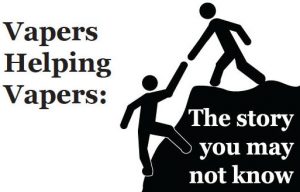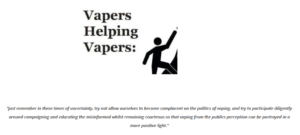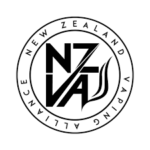 AVCA is truly a grassroots organization and our success depends completely on community involvement and support. If you currently use smokeless alternatives to combustible tobacco, our goal is to ensure that these reduced harm alternatives become and remain available, affordable and effective.
AVCA is truly a grassroots organization and our success depends completely on community involvement and support. If you currently use smokeless alternatives to combustible tobacco, our goal is to ensure that these reduced harm alternatives become and remain available, affordable and effective.
Funding is utilised solely for the running of the charity, there are no salaries paid (all board members are volunteers) so all the money donated goes back into the community via our advocacy and outreach programs in the community.
Please consider making a one-time donation or set up an automatic monthly donation to help us help you.
AVCA is a charitable trust board meaning we are a non-profit organization. Contributions to AVCA can be receipted (upon request) for tax purposes.
]]>
Link to original press release from ARFNZ is here.
“There is no evidence for a public health claim for an unregulated approach to e-cigarettes and personal vaporizers. ARFNZ recommends that if there is support for e-cigarette use in New Zealand as a smoking cessation device, then these products should be classified as therapeutic devices and regulated through Therapeutic Goods Administration (TGA), Medsafe and PHARMAC.”
The call for “medicalisation” is in direct opposition to saying “there is no evidence for a public health claim”. If what they mean is medicalisation is the only regulatory approach that they find suitable (which I presume they are, in fact, saying) then what they are really saying is that they want only products from companies that have the funds (thousands if not millions of dollars) to go through the regulatory process. In other words, you are looking to completely annihilate the independent vape industry and hand out engraved invitations to tobacco and pharmaceutical companies while at the same time telling adults that they have no right to choose harm reduction to reduce risk of illness and death? That sounds a ridiculous to us as it is for us to say to you you might as well tell adults that they don’t need seatbelts, condoms or helmets, and to immediately stop the campaigns promoting vaccination and childhood dental hygiene too. Sounds ridiculous doesn’t it? That is because it IS ridiculous in both contexts.
“If not intended as part of a smoking cessation plan then e-cigarettes should have the same restricted sale and accessibility placed on them as conventional cigarettes e.g. prohibit sale and supply in public places, not sold to under 18 year olds and no point of sale advertising of e-cigarettes and e-liquids.”
Read as: in reality, we consider e-cigarettes as a medical product and therefore, if not a medical product they must be tobacco products, ala TPD. Except my atomiser does not contain any tobacco, nor does my mod, batteries or the e liquid I use. Interestingly enough, the nicotine in my eliquid is the same pharma grade nicotine that is used in NRT and THAT isn’t considered a “tobacco product”.
“The last thing we want to happen is for our young generation of New Zealanders to pick up e-cigarettes thinking they are not harmful and inadvertently becoming an entry to a smoking habit,” says Dr Stuart Jones, President of the Thoracic Society of New Zealand and Medical Director of ARFNZ.”
Dr. Jones might wish to read the studies done in the UK regarding “The Gateway Effect” – that is the now disproven theory that vaping leads to renormalisation of smoking and induces youth to smoke themselves. He might also consider making himself familiar with science and policy in the UK where the smoking rates have decreased dramatically since the promotion of e-cigarettes as an option for THR and the availability of the same items in the US, where smoking rates have also shown the same level of dropoff of combustible smoking rates. There’s a multitude of robust data already out there to peruse through that shows science-based facts around vaping.
“The position of the Thoracic Society is that these products are likely to be harmful to the lungs long-term. We cannot think of any other product which is manufactured to be inhaled, that has not been through stringent regulatory controls. This is vitally important and e-cigarettes should not be given a free ride. We have seen the damage caused by letting cigarettes escape regulation and New Zealand can ill afford to make the same mistake again,” says Dr Jones.”
“Likely to be harmful to the lungs..” is a (flawed) perception based on the concerted disregard for the fact that e-cigarettes have been around since 2005, became “mainstream” in 2007 and have ten (10) years of science that has shown they are an effective “Tobacco Harm Reduction” tool. Tobacco Harm Reduction (THR) is what vaping is all about. Life is inherently risky, and just as individuals choose to use helmets, seatbelts, and condoms, using e-cigarettes is about harm reduction.
In terms of e-cigarettes being used as a smoking cessation aid, the evidence is weak at best. We have heard that e-cigarettes are likely to be less harmful than conventional cigarettes, but there are many alternatives already available to assist smokers to quit which have passed stringent regulatory processes. We urge real caution with respect to e-cigarettes. We recognise that for some individuals who struggle to give up using current smoking cessation aids, the use of e-cigarettes may be beneficial, but we need to make sure that we’re targeting that group,” says Dr Jones.
Public Health England and the Royal College of Physicians (your colleagues in the UK) have PROVEN that e-cigarettes are less harmful than combustible cigarettes. However, the real point here, as far as I can see it, is that the “alternatives that are already available to assist smokers to quit” have failed, and failed miserably. The advent of e-cigarettes was a consumer driven phenomena from consumers who wanted an alternative to combustibles because the aforementioned “alternative” failed and failed miserably.
That failure, which is wholly owned by those who refuse to acknowledge “THR” and instead preach “quit or die” is two fold – the first being the mantra of “quit or die” – which is at best patronising and at its worst stigmatising/denigrating has been a wholesale failure in this context. The second being that said “alternatives” do not address the behavioural aspect of ritual that is ingrained in many smokers. The issue is not black and white as you suggest nor is it something you fully appreciate until you have “been there done that” like those of us who vape have.
“Using unregulated e-cigarettes to reduce tobacco smoking in Aotearoa is akin to introducing stoats to control rabbits. This concept of becoming so widespread and of greater negative impact than originally thought is of concern here. Another current issue is unregulated ingredients – anything could go in them. If used as part of a smoking cessation plan, the Government should ensure that nicotine e-cigarettes and e-liquid (vaping products) are regulated with product safety standards,” says O’Dwyer.
Considering that the current “alternatives” are failing miserably, and the switchover rate that we have in our mentoring programs is +/- 97%, I fully disagree with this statement. The vaping community are the ones you need to make an effort to engage with so you can understand the real world implications and realities of e-cigarettes in practice.
As far as regulation, you are aware that the current discussions on regulation includes product safety standards. What you may not be aware of is the majority of the independent vape industry in NZ, whilst currently unregulated by government, is actually self regulating by choice, and the consumers of NZ applaud those that are part of the self regulation scheme as it shows their professionalism and respect for the vaping community. Again, to know these things you would need to have engagement with the vaping community – as they are the benefactors of the technology and have no other vested interest in the process besides self determination and control of their health.
“Since the Government has voiced its stance, the ARFNZ urges that in addition to regulation, e-cigarettes be part of a proper smoking cessation programme by the Ministry of Health – a wraparound service involving health professionals at a primary and community care level.”
In the beginning of this you clearly stated that “In terms of e-cigarettes being used as a smoking cessation aid, the evidence is weak at best” and then you call for them to be part of a proper smoking cessation programme that involves health professionals? The dichotomy of this statement is not lost on anyone who vapes. It means/shows that you fail to realise that the majority of vapers in New Zealand have found this technology without the assistance of health professionals. You are, in fact, discounting their achievement because it was done independent of you. Reality is, it is an achievement and it is not necessary to “medicalise” the process for it to be “effective” as it already is in the community.
In other words, what we would like to see is less conjecture from the medical community and public health and more objectivity, acceptance of evidence based science and engagement with the people who actually have utilised the technology to switch from combustibles.
The ARFNZ also raises concern that there is significant conflict of interest on the Ministry of Health Electronic Cigarette Technical Expert Advisory Group with three industry representatives (including a buyer for Cosmic retail stores) giving advice on Electronic Cigarette Product Safety. This is like putting the fox in charge of the hen house.
Interestingly enough, that is exactly how the majority of vapers in New Zealand feel about the need for the medical profession and public health experts to medicalise their self determined choices in Tobacco Harm Reduction. There is a conflict of interest in wanting people not to smoke and then criticising and denigrating the choices they do make if they don’t fit within a medicalised protocol – the same protocol of NRT that has failed most and led them to vaping. Interesting indeed.
ARFNZ voiced its position statement at a Ministry of Health meeting on 7 November 2017, discussing the update on proposed regulations for e-cigarettes and nicotine-delivery products.
You and your colleagues have the position statement from the vaping community that we, AVCA, present on their behalf. If you wish to engage and have discourse, please feel free to contact any one of us via our website.
]]>Yes vapers too, are now ostracised also to the back alleys to reunite with the very addiction they had spent many a year trying to dissociate from? It begs the question why the act of vaping has instilled so much negative press when recently released ministry of health reports have clearly stipulated that vaping has the contributive potential to assist in making New Zealand smoke free by 2025? http://bit.ly/2jHuoOS
Do vapers concede to the fact that Invercargill councillors made the right decision in maintaining the right for the public to breathe in their fresh southern air with no expense added by the smoker’s second-hand fumes wafting their way?
Well yes and no… It appears councillors may have reacted with too much spontaneity and without forethought when considering vaping in mind, it is, therefore, disingenuous to say that the city council want a smoke-free city while ignoring any attempts to find alternatives to smoking?? Or in this case alternative “designated vaping area’s” other than an alleyway which clearly depicts their mentality of an ‘out of sight out of mind’ attitude.
Not only in Invercargill has the smoke-free message been clearly implemented, so too are other provincial cities such as Rotorua and Whanganui, http://bit.ly/2g88sPx where vaping is banned, not by law but by policy, in which these policies must be adhered to or otherwise told “nicely” by concerned public to move along, even though defined by law that vaping in smoke-free places is not prohibited by the Smoke-free Environments Act 1990, but can be manipulated to suit by council policymakers regardless.
It should be noted that the majority of smoke free policies have been welcomed accordingly by the vaping community as a means to not be reintroduced or influenced back into an addiction they had worked tirelessly to escape from, however merging vaping into the same basket as smoking because of a group of misinformed councilors who feel the need to negate scientifically proven data around the efficacy of vaping, or have collated spurious ramblings from the astroturfing pseudoscientists who choose to believe there is no place for vaping in society, just does not sit right with vapers at all!
If this becomes a problem when disseminating between what evidence is rot and what is robust, then this only leads to a state of more confusion around differentiating between the two of smoking vs vaping with the public… and obviously most of the council!
Another scenario to consider is our children and youth who apparently when faced with vaping, see this as a gateway and a means to renormalising smoking behaviour’s, but of course this hypothesis has been debunked that many times it’s not funny, but obviously it needs reiterating with local councilors but I hardly doubt they’d listen to a word! as the whole contentious debate on vaping has been widely fought by all in sundry by every anti-vaping organisation out there, due to the ‘kids’ needing to be protected from the iniquitous actions of a vaper!
I do however see some valid points that are raised as noted in last year’s reports by Otago University http://bit.ly/2dzHT2G and a contrasting response from Auckland’s Massey University http://bit.ly/2zv8ybP … but there are certain issues that need further addressing once more robust data emerges, so I’ll just contend with waiting upon the veracity of reliable science and SENSIBLE restrictive legislation on dealing with that sensitive topic.
AVCA find it very frustrating when trying to validate vaping to the public arena (and some SSS cohorts), that the beneficence from transitioning from tobacco harm helps necessitate smokers towards a smoke free lifestyle, and if making that decision to change for the best to further improve one’s health, then being told to vape out of sight and out of mind sends a pretty dismal message on incentivising vaping?
PH has already made it quite clear that smoking-related diseases are a burden on the public health system as too is obesity and sugar, but no disrespect to people of the fuller figure as it is their prerogative if they choose to eat a fatty diet, just as smokers opt to indulge in a cigarette, and if a smoker wants to quit they can select between the NRT options or vape therapy, such as with an obese person who wants to diet, there are a multitude of gyms and dietary plans to follow.
But as for being a vaper, we seem to be in our own little niche with very little service input from health providers other than ourselves in providing a supportive hand, furthermore AVCA believes it’s vitally important that all DHBs, NGOs, GPs, TC, PH & SSS send a clear message to the public that there’s room for utilising vaping in the community and that everyone across the board realises that harm reduction goes far beyond the old paradigm of “quit or die” and that vaping is yet another integral solution via an Electronic Liquid Vapourisers System (ELVS) that can be a deterrent against tobacco use and tobacco related harm and should be seen as that by public, and not perceived as a product of harm towards non-users, passerby’s and children.
… However, so to the smokers in Invercargill that have recently found liberation from the domination of combustibles… you are rewarded with the pleasure of knowing you can revisit once again the smokers in the alleyways and back streets of your great city! Which makes me wonder if it is truly about that person’s health or not? therefore smokers & vapers can expect anytime soon to be joined by the bariatric public who have been told to consume their burgers down the alleyway (food for thought), whilst alcoholics roam freely inebriated across the city inflicting pain on themselves, property and others… but it is great to see towns like Rotorua, Whanganui and Invercargill have councillors and mayors that we can rely upon to have their priorities straight.
Elsewhere in New Zealand though, Auckland City Council has proven to be quite accommodating in supporting vapers on not banning them from a necessity that keeps them from the clutches of the cancer sticks, and just as well vapers weren’t relegated to Auckland’s myriad of back alleys, as that would have proven to be a very unwise and unsafe choice by ACC.
Recently, Maori public health group Hapai Te Hauora a National Tobacco Control Advocacy Service (the only PH group presently that’s vape empathic) spearheaded a campaign against Auckland City Council in having them acknowledge that vaping was needed to be excluded from their smoke-free policy… the council then moved forward in stopping smoking in public places, but had allowed vaping to be excluded from that policy.
This would have been interesting to see the consequences of that notion, which inserting the policy would have otherwise proven to be a waste of time and resources in enforcing such a decision around a vaping bylaw in a major city such as Auckland.
But as succinctly stated by Hapai, “not to victimise and not to punish” so I really hope Hapai can persuade other local councils around New Zealand also in adopting this mantra if they too were ever thinking of making vaping inclusive in their future smoke-free policies, http://bit.ly/2x3FcNk
]]>
 Just an update from AVCA Central for those interested. Hard to believe that we have been officially doing our thing for over two years now (Mind you we have all been at it for much longer, but officially, when we decided to organise that is), but here we are!
Just an update from AVCA Central for those interested. Hard to believe that we have been officially doing our thing for over two years now (Mind you we have all been at it for much longer, but officially, when we decided to organise that is), but here we are!
First, we would like to announce that we have begun adding to our group of merrymakers here with the addition of Hazel Lyn Malgapo Mallare to AVCA as our Research and Resource Coordinator. Hazel has kindly accepted our offer to be our researcher and help to post information to our Facebook Groups, and assist with the management of our (eventual, currently in process) resource library for our website. This will be of great assistance not only to the Jan who has been doing the work of four people these past months, but also to the community as more information comes to light and is shared so that folks know what the latest is as it relates to science, legislation and global concerns surrounding tobacco harm reduction.
Secondly, the board of trustees has had our quarterly meeting and from those discussions we have firmed up the plans for the Vape It Forward program. We have known for some time that it needed to evolve. The more vapers there are, and the more vendors that are out there in our communities, the less of a need to provide loaner equipment and sundries to those who wish to switch to vaping from combustibles.
Therefore, the VIF program will now consist of two parts – the first being the original AVCA VIF Mentor/Advocate program, whereby new vapers will have access to a mentor/advocate to support them during their transition and the new, second part which will be launched on our website in January 2018.
The second part is the expansion of VIF to provide information, evidence and resources to District Councils, District Health Boards, Primary Health Organisations and other interested organisations who wish to know more about vaping, and who can access information that is objective. There will be a resource library of scientifically verified information on all aspect of ELVS, as well as results from various VIF mentoring programs throughout NZ, as well as the latest news and information from a legislative and technological viewpoint made available through our website (www.avca.org.nz).
We are doing this VIF expansion to keep the vapers, and interested parties of/in New Zealand informed with up to date information as part of our mission of “Inform and Educate”. Once it is setup and running we will inform everyone through social media, and will be providing updates through our main Facebook page.
There are other campaigns and programs that we will be initiating as we go forward obviously as we address the changing nature of the situation for vapers here in New Zealand (and elsewhere).
And so it goes…..any questions please feel free to contact us.
10 November 2017, Masterton New Zealand
]]>We finally have a new government, including our new Minister of Health (David Clark) and two new associate Ministers of Health (Julie Ann Genter & Jenny Salesa). We are pleased to see the choices include those whom have a track record of concern and empathy for the well being of all New Zealanders. It now their time to shine. And ours too.
For far too long, those who had no voice were represented by those who used their plight to further their own vested professional and financial interests, and at times have quite openly, attempted to stifle (and attempt at times discredit) the self representation and determination of vaping consumers of New Zealand.
AVCA, as most know by now, is run by volunteer vapers/former smokers whose whose sole interest is the self determination of their health and those around them by providing scientific evidence, sharing knowledge and providing support to all interested parties that is gleaned from real work experience as former smokers/current vapers. We are an inclusive community, and have run numerous pilot programs countrywide through our VIF program, including a small cohort Mental Health patient VIF group, to assist smokers onto vape. All of these programs have had high success rates (96% for standard VIF pilot, 80% for MH VIF small group). We are proud of this work, and have much more to do.
This is why the board of directors has agreed that the time has come to expand our VIF program to include local Councils, DHBs, PHO’s and community organisations to get the information to them in order to be able to make informed decisions surrounding the use of ELVs, the action of vaping in public and the benefits. This has already begun informally in locations as far afield as Invercargill. There is an entire country that we represent and who have and will benefit from what we know and what we do, as is shown from the consultations with the previous government where we have provided information, evidence and guidance.
We firmly believe in “nothing about us, without us” and it is hoped that the new government will also accept our offer of guidance and knowledge as they draft the legislation surrounding vapings’ place in the toolbox for a SmokeFree 2025.
Excelsior!
Those interested in our new organisational VIF framework, please feel free to contact either Steve, Jan or Nancy.
]]> 21 September 2017
21 September 2017
Masterton, New Zealand
Writer: Nancy Sutthoff
In case you haven’t noticed, I have not been active for the past two months on social media and I have to give credit to Steve and Jan for taking up the slack whilst I have been recovering from surgery. Alas, my 8 weeks are up and it’s time to get back in the saddle, so here we go! (If you thought that you were rid of me, you were sorely mistaken #sorrynotsorry) 
Where we are – an update
There have been a lot of questions prior to and since the announcement of the Technical Expert Advisory Committee TEAC that we have received. No, AVCA was not included on the committee and no, we have not received a clear answer from the Ministry of Health as to why that is outside of “there were more suitable candidates”. In saying that, Dr. Marewa Glover commented on Facebook that “Regarding make up of Ecig Advisory group…I was nominated & didn’t get on either; appointments were made for range of views & different stakeholders… the group are not looking at HnB, Snus etc – that’s another process – the pre-market approval work.” So in other words, the group *is* tasked with hammering out how legalisation will work, including any limitations on nicotine mg, bottle sizes and safety features, retail requirements, etc. Is it disconcerting that we were not chosen to participate? Yes. Ideally it should’ve been an open forum of dialogue and transparency between all consumers/vendors and government and not the closed door rules of a select committee dictating what the vapers voice should sound like without the actual input of a vaper with no vested interest in the outcome.
As Steve noted in his blog post earlier this week “we can only hope that the selected members of the TEAC realise the task before them is vast, and hope they all realise that they are part of setting a precedent in not only New Zealand, but the rest of the world, especially in Asia Pacific.” Because we, in New Zealand, are doing some groundbreaking work with regards to the legalisation of nicotine e liquid in this part of the world, as well as future proofing the reduction of harm from combustible tobacco products. This is precedent setting stuff…and not just for New Zealanders but also for Australia, Malaysia, Indonesia, China, etc.
I will note that we have been contacted by a number of community members asking who these people on the committee are and if they work *with* us as the choices do seem to be very limited in geographic scope to Auckland It is also disconcerting that a member of the TEAC has felt it necessary to taunt AVCA on twitter and social media publicly, which we have been questioned about as well. These are valid concerns and we have addressed them as best we can and have suggested the concerned parties contact the individuals directly with their specific questions. They may do that, they may not. And whilst this adds to concerns that vaping consumers interests will not be fully acknowledged or represented objectively, we can hope that the Technical Expert Advisory Committee Terms of Reference will provide for that objective representation during the process, which we are looking forward to commencing sooner rather than later.
Hot Topic of the Moment
The hot topic both within the vaping community in New Zealand and abroad is the Heat Not Burn (HnB) technology that is being promoted by tobacco companies as “reduced risk products” that they hope will eventually be their main “bread and butter” instead of combustible tobacco. Whilst there are concerns surrounding the technology, nowhere has any one of the board members stated unequivocally that it is not an option for the toolbox of harm reduction. There are some who would like people to believe that AVCA is anti-tobacco and/or anti-HnB to serve their own agendas. If having and holding concerns about a particular product – be it a particular e liquid, tank, or device makes them “anti” anything, then the problem lies in the perception of the individual(s) making those claims against us.
In this, I am reminded of a blogpost made by Robert Innes in Vaping 360 entitled “Prohibition or Harm Reduction” that covers this topic where he stated “Harm Reductionists do not question Heat Not Burn with a view to stymying or preventing its further development – it is just a genuine issue. At this point, we just do not know enough. There are issues. But there is absolutely nothing to support a view that regulation is needed to ban or limit the product.”
In other words: asking questions does not denote a desire for prohibition or limitation to access. The questions that remain *are* within a New Zealand context in how PMI went about the introduction of their product in our country back in December 2016 as noted in Jan’s blog post so I need not cover that ground again.
Vaping Community Perspectives on alternative nicotine consumption methods:
We did, in our Public Forum, provide the wider NZ community both sides of the HnB controversy when it occurred and we provided the science and commentary as well as stated that we are not anti HnB or even anti RRP. The community is not in full agreement with us on this, however. We can only provide the information and input and people will make their choice. Choice being the operative word here. There are plenty of vapers who despise anything “big tobacco” related; there are vapers who do not understand why someone would choose HnB over vaping and there are vapers who believe, as I do, that extra tools in the toolbox are always a good thing and the technology may well serve those for whom standard NRT and ELVs have not sufficed in their journey towards being smokefree.
AVCA is not alone in our views and priorities – we are a vaper advocacy charity run by non paid volunteers and reliant upon donations from the community for our website hosting fees, postage and sundries. Our mandate is to focus on “educate, inform & advocate” for vapers above all others – including snus, HnB and other nicotine consumption methods outside of combustibles. This also allows us to comment transparently and honestly on anything that affects us as we are not hamstrung by disclosure or confidentiality agreements or concerns about impacts on fiscal interests.
Where do we go from here?
We keep on keeping on…in the communities, providing information, guidance and assistance. None of us on the AVCA board were or are looking for the kudos for the work, this was never about mana, attention or professional acknowledgement. We are still the same group of experienced vapers from diverse backgrounds at the coalface helping smokers and vapers and interested parties alike to understand their options and assist them to make choices as educated consumers. We are a vapers advocacy group, our mandate is “educate, inform and advocate” for vapers.
Our vaping community in New Zealand has grown exponentially in the past two years to well over 50,000+/- vapers. Much of this work is being done one to one through the work of the vapers themselves, as the web of the VIF concept has gone out and spread. That success belongs to the vapers of New Zealand as a whole, not any one particular person or organisation. It would behoove all of us to remember that people who vape or want to know about vaping are the CORE of the work we do – be it as a vendor, public health expert, policy specialist, healthcare worker. These same people are spouses/partners, children, parents, relatives, friends and colleagues. As I have stated before, envision a wheel with its hub (people), spokes (information, equipment and support), and the rim (collaboration, community at large) that pulls it all together.
]]> 20 September 2017
20 September 2017
Wellington, New Zealand
Writer: Jan Walsh
In other news, following along with our “Think Globally, Act Locally” theme:
The Foundation for a Smoke Free World. Website: https://www.smoke-freeworld.org. There have been many announcements across the globe on how PMI is helping to establish the foundation with a $1bn dollar endowment.
Questions have already been received from vapers, in keeping with the theme of “what is best for individuals”, that there is a valid concern that this is nothing more than a brilliant (manipulative) guise for PMI to promote their Heat Not Burn product as *the* ‘vape technology’ with the help of free testimonials from some of the most respected experts on nicotine harm reduction. Is this, perhaps, a negative view or is it a pragmatic approach to the foundation and its funding? Time will tell.
It would be more transparent if there were a coalition/collaboration of all the big tobacco companies (BAT, Imperial, Reynolds, etc) to fund the foundation and the science that it is purported to be used for – simply to remove the spectre of doubt from the vaping community. The vaping community really does not hold much weight in the eyes of PMI, as they have shown repeatedly with their actions here in New Zealand, which leads to the distrust in the first place with comments made to MP’s and other higher ups that ELVS “cause water on the lungs” and that “heat not burn is the best option available for smokers.” Never mind the way the heat not burn product was introduced covertly and has led to a High Court Case that will be heard in March. Some of the PMI folk see that as a bonus, free marketing/promotion. Arrogance? Ignorance? Both?
Frighteningly enough, the WHO FCTC actually sees that disconnect, even if some of the experts and advocates refuse to acknowledge it. And choose instead to lambast those that question the motivations as shills for TC or “throwing smokers under the bus” by having reservations regarding the foundation. http://www.who.int/fctc/mediacentre/statement/secretariat-statement-launch-foundation-for-a-smoke-free-world/en/
Heat Not Burn (HnB) technology may well be the best option for *some* smokers, that is a no brainer. Any technology that offers reduced risk and harm is a bonus for everyone, everywhere. However, the very valid concerns that PMI is playing everyone are proven by their claim in December 2016 that they were “planning to remove themselves from the combustibles game’ ((http://www.bbc.com/news/business-38152297) is utter effluent. Simply because that mantra exists *only* in countries where their combustible revenues are waning. The countries where there are not concerns or lost revenue are not being addressed similarly and IQOS is certainly *not* being marketed in those countries (not that any of the folk there would be able to effectively afford or utilise the technology).
HnB certainly is not vaping as we know it and it certainly needs to stand on its own merits instead of riding the coattails of the consumer driven/based ELV market. Have we not all spent the past few years fighting with governments and councils and Public Health to prove to them that vaping is NOT tobacco? We fought for a division that needs to remain in place for transparency and clarity. In the final analysis, HnB is still tobacco, which along with nicotine in and of itself is not a *bad* thing regardless of FCTC dictates. (We all know already combustion is the issue with health/harm).
Realistically, a big conglomerate has to generate profit and please shareholders. Of course, that is business. However, it is disingenuous to ignore the lack of transparency and inclusiveness of the campaign by PMI; as well as the lack of interest to actually address and enter discourse with those in the community who have questions and concerns – instead shutting them down as being “shills for Public Health/Tobacco Control”. (Are we adults or are we in the 3rd form?).
Questions have also been raised why other tobacco companies with similar products are not speaking up and joining the foundation. Surely they would realise that the behaviour of PMI, in the New Zealand market at least, casts a dark shadow over the technology of HnB that they themselves have invested in with R&D? Or is it more that they are waiting for decisions out of America regarding their RRP products and then will proceed to overtake the market with their products. It is hard to tell, but it is something to keep discussing and analysing so that we are not blindsided.
In summary, if the delineation of vaping and HnB tobacco products is lost, then we have lost. (it is fairly obvious from the document above that WHO already considers them one and the same). That loss includes, however unpalatable, the very core of our credibility as vapers. Also there is the very real possibility that in the near future we may lose our right to choose what is best for our own needs in terms of more restrictive legislation, bans on flavours, limits on equipment/e liquid (as seen in the EU’s Tobacco Products Directive) – especially if the independent vape industry is overtaken by BT.
]]>
20 September 2017
Wellington, New Zealand
Writer: Steve Dohmen
It has been a rather interesting winter here in the Antipodes…to say the least! Australian TC and their groupies have tried and, thus far, succeeded in preventing not only the legalisation of nicotine containing e liquid, but have also managed to make it clear that they wish not to entertain the thought through open discourse, transparency and logical assessment of the science regarding the topic. Not surprised, to be honest, but extremely disappointing that those who are mandated to prevent harm are, in fact, causing it.
Meanwhile, in New Zealand as we head into the last week before the general election, notifications were made of who the successful candidates for the Technical Expert Advisory Committee (TEAC) to make clear the requirements for the eventual legalisation of nicotine e liquid and nicotine containing reduced risk products in mid 2018. The lack of a true unbiased consumer voice on the TEAC is concerning. (Consumer definition in this context: someone who has utilised their own personal experiences with vape to help themselves and others and who has no fiscal vested interest in the eventual outcome.) When enquiries were made as to why none of the consumer representatives put forward for nomination were selected, the response was that there were more suitable candidates (??).
Ultimately, we can only hope that the selected members of the TEAC realise the task before them is vast, and hope they all realise that they are part of setting a precedent in not only New Zealand, but the rest of the world, especially in Asia Pacific. It is hoped that they understand the gravitas of their task and keep that in mind when having discourse and making decisions, fully understanding that THEY are mandated to represent the community before their own interests as outlined in the Terms of Reference for the committee,
At the local level around New Zealand (outside of the greater Auckland metropolitan area that is), DHBs are not willingly taking on board the MoH advice regarding vapers on board and are still marking them as smokers in their medical records – as well as advising local councils that the use of ELVS and vaping is just as bad as smoking and should be treated thusly. We have given consumers the information they need to fight back against the tide of ignorance and we seem to me making some headway, but it is slow going.
Part of this problem is the perception of vapers and vaping as some kind of countercultural fad – cloud chasers and tricksters. To put it bluntly, there is a lack of courtesy on the part of some vapers in public who feel no need to respect that maybe the person next to them doesn’t want a cloud of fruity flavoured vape in their face, which negatively impacts *all* vapers. There are also some who promote this behaviour as being “well within their rights” and will even blow clouds at TV cameras as a show of defiance. This is not about “self determination” this is about attention seeking and is immature at best. That being said, the *majority* of vapers get the courtesy thing, but the rebellious few who choose to behave inappropriately make the most impact on public perception.
What are the rest of us doing? Exercising our right to choose a less harmful method of nicotine consumption and advocating for education and information that will help others make the best choice for THEIR individual needs. As we (consumers) are not represented on the TEAC, we can only hope that those tasked with the responsibility and that answers are found as to the reasoning behind this exclusion of the wider community and their interests south of the Bombay Hills.
Kia Kaha & Vape On!
]]>Steve Dohmen
Our current New Zealand government, as it stands, are pretty progressive in regards to vaping, by having shown an interest in assuring a fair regulatory approach that best accommodates future vaping legislation in NZ, and there’s even a minority of cohorts from tobacco control that acknowledge vaping’s beneficence… but we are also consciously mindful that come election time our hard fought submissions in helping motivate policy change could be eroded by a new party of less than empathic legislators?
In NZ, selling e-liquids containing nicotine is still technically defined as illegal (however it is legal to import your own supply of nicotine for personal use), but are readily available to consumers for sale at B&M and online vape shops across the country. This is a grey market area that is unenforceable to uphold by authorities especially as their intentions have become publicly clear now that they will legalise and regulate products containing nicotine in mid-2018 as per the Cabinet Social Policy Committee who have agreed in principle to nicotine in electronic liquid vapourisers (ELVs) being lawfully available for sale and supply in NZ.
With the tireless support and cooperation of vendors and advocates such as AVCA, VTANZ & VANZ whom have collectively defined an initiative to self-regulate vaping in NZ using AVCAs Addendum to Submission on “Consultation of Policy Options for the Regulation of Electronic Cigarettes” http://bit.ly/2viGVh1 we have relentlessly pushed through submissions and emails to ministers of different parties to best implement safety and consumer-driven policies for vapers around the country as well as to help govt officials realise the potential of using vaping as an alternative THR tool. Furthermore the soon to be formed advent of the ministry of health’s new Technical Expert Advisory Group that will be made up of nominees having knowledge of the risks and benefits associated with the use of ELVs as well as an understanding of the e-liquid/device products market in New Zealand, the legislative framework, as well as a consumer perspective on the use of ELVs; this will serve to further cement a fair framework for policy, as the consultative process would now include true expertise around all the variables that vaping diversely consists of.
Because these initiatives are now being seen by the vaping community as being implemented in the near future, there has been no need or an emergence of a black market within the vape scene as in stark contrast to our counterparts in Australia, http://bit.ly/2ipObFW and because vendors and vape consumers share such a tight knit community through loyalty and support, as well as a growing network of thousands on the Facebook vape pages, any resemblance of criminality in regards to vaping that may suddenly arise is quickly quashed by vaping loyalists throughout the country… so we’d definitely be the polar opposite of this scenario ever happening in NZ http://bit.ly/2xbLVoY
However it would only take a few upsets in the election polls to force in a new govt where the changing of parties could lead to irreparable consequences if ever an uncompromising health minister changes the playing field in tobacco control and completely disengages consultation around vaping and following the Australian template of probitionism? We are nonetheless currently noticing a significant surge in black market tobacconists being established as a result of rising tobacco excise taxes, plus a spike in escalating violence and robberies toward shop keepers as cigarettes are becoming a lucrative commodity for the criminal elements http://bit.ly/2w2mW7e – which is exactly why vaping needs to be left well alone to ensure that there’s a significantly healthier and a more affordably safer option that’s accessible to smokers if ever they need to transition… because the question needs to be asked if TC ever want to achieve their goal target of a smoke-free NZ by 2025, so in the interests of the public, vaping needs to be embraced and lauded for its effectiveness, not demonised.
In reference to an article recently published ‘the new oil rush’ http://bit.ly/2v8Lqyx, “is heat-not-burn (HnB) products becoming the dominant market changer against vaping in NZ?” Well AVCA believe that people offering up ‘harm minimising’ initiatives for smokers can appear in many guises – including BT, but if their intention was to atone for all those years of revenue gathering and carcinogenic harm caused upon smokers whilst on their products, then kudos for finally admitting culpability for their damage (or that they’ve sustained a significant downturn in smoking sales due to vaping uptake?).
Be that as it may, public do need to differentiate that vaping is classed as a consumer product here in NZ and HnB even though it’s promoted as being a potentially less harmful alternative to tobacco smoking, it would still be classed as a tobacco product, http://bit.ly/2w2JlBm whereas another product from BAT known as the Vype pen, is a full vape device and not a smokeless product that contains tobacco… PMI are doing their best to establish a foot hold on the market here with their innovative range of HnB products such as the IQOS, but without any veracity from an unbiased credible third party other than their own team of scientists, then MoH will hopefully never allow a product such as this to become aligned with vaping as a consumer product. http://bit.ly/2v4jOuA
“just remember in these times of uncertainty, try not allow ourselves to become complacent on the politics of vaping, and try to participate diligently around campaigning and educating the misinformed whilst remaining courteous so that vaping from the publics perception can be portrayed in a more positive light.”
]]>GFN17 was an experience I am so glad to have taken part in. The concept of Harm Reduction: Saving Lives is what AVCA is all about – one person at a time. This year, I found the “vibe” to be much more inclusive and collaborative between all the attendees without the usual “battle lines” drawn between advocates, public health and manufacturers, which was not only refreshing but also confirmation that we at AVCA, who work with ALL stakeholders, are indeed on the right track with our advocacy and our plans for the future.
One of the things that I believe we, as consumer advocates as a whole, need to seriously consider and take action on is supporting vapers who currently have no voice through a consumer representative organisation. There are so many of our fellow vapers out there who do not have a clue on how to advocate effectively and what they need to do, and are literally begging for help, especially in places far and wide, such as in in Asia and Africa. This something that INNCO – the international consumer representative organisation – was set up to do and it is up to each of the country organisations to take on and assist within our own regions. Help your neighbour, GET INVOLVED, share your knowledge and expertise, and help unify the community on a global scale.
It was a personal highlight for me to meet again, after 30 odd years, with Ethan Nadelmann, who has always been an inspiration to me with his passion and dedication to advocating for and helping others, providing them with a passionate voice. I had volunteered back in the 1980s at the GMHC in NYC during the height of the HiV/aids crisis when he was also heavily involved in the programs there. Proving that wherever you go, there you are.
Ethans’ MRO resonated with me, especially as I personally remember the HiV/aids crisis of the 1980s-90’s. Harm Reduction need not be punitive, it need not be painful. But it does need to be inclusive, consistent, science based and people focussed – compassionate, empathetic and supportive.
Advocacy in all its forms seeks to ensure that people, particularly those who are most vulnerable in society, are able to:
- Have their voice heard on issues that are important to them
- Defend and safeguard their rights
- Have their views and wishes genuinely considered when decisions are being made about their lives
Advocacy is a process of supporting and enabling people to:
- Express their views and concerns
- Access information and services
- Defend and promote their rights and responsibilities
- Explore choices and options
I was also humbled to present to the conference what we do at AVCA, as well as explaining how we do it, and why. I hope that I was able to convey the scope and passion we have towards our advocacy and harm reduction and perhaps inspire someone as I have been inspired by others at both last years and this years GFN. That is what I think is most important for consumer advocates who are able to attend the GFN – the ability to talk to other people who do what you do, and get feedback, confirmation, support and guidance. It makes our practice that much more effective and our work that much more valuable. It is never about any one individual, but about the whole. We are all part of the whole and the GFN reminds us of that, and makes us more united and stronger as a unit. A global family of like minded, passionate and motivated members. Granted, am still processing a lot of it as so much was going on, but definitely feeling secure that we are on the right track.
]]>










